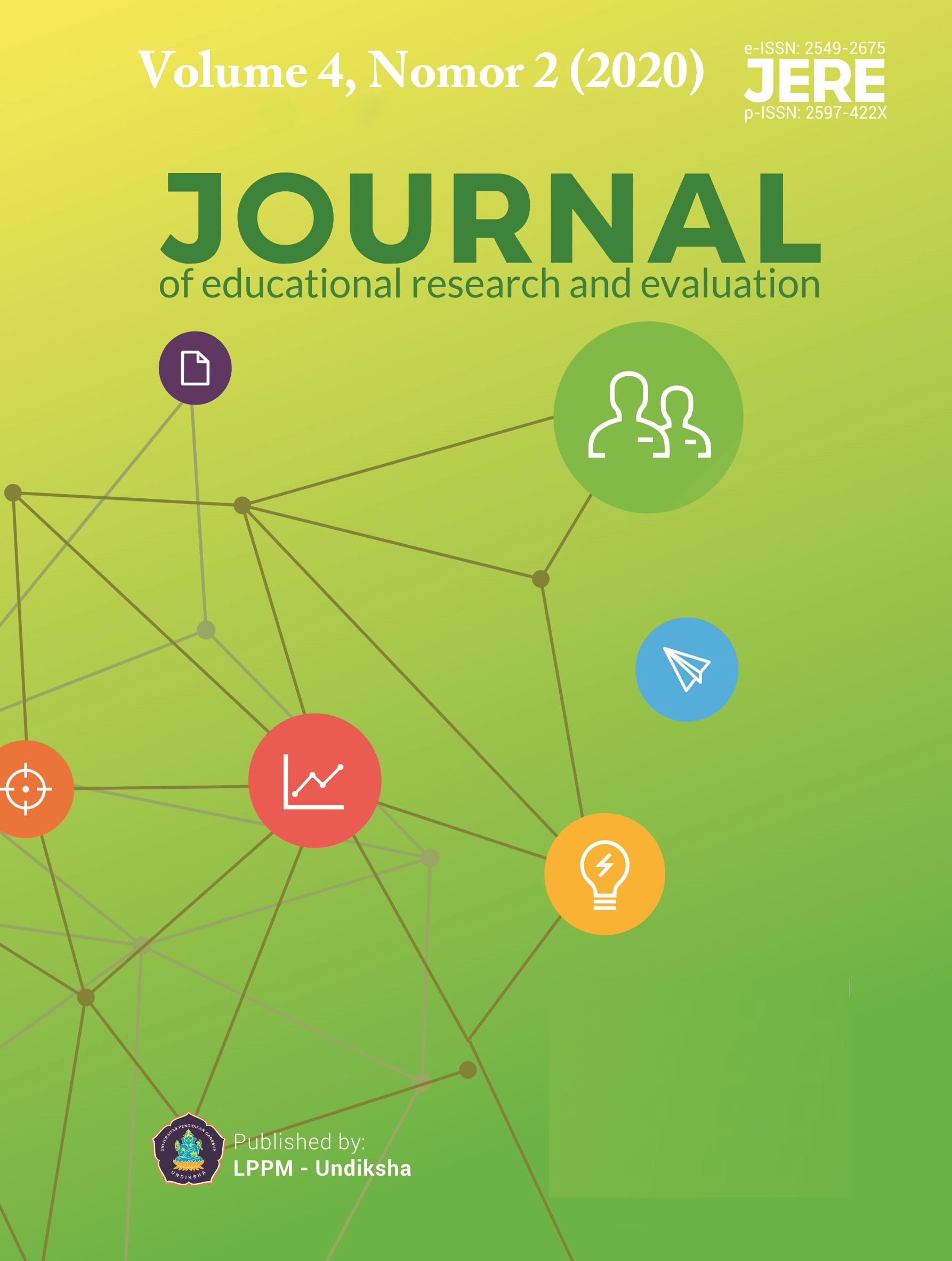Evaluation of The Block System Implementation at Permata Harapan Vocational High School
DOI:
https://doi.org/10.23887/jere.v4i2.24607Kata Kunci:
block system, vocational, block, schoolAbstrak
This study aimed to evaluate the block system implementation in Permata Harapan Vocational High School based on (1) understanding and apply the block system conducted by teaching staff, (2) understanding of block system implementation by students, (3) availability of facilities and infrastructure at Permata Harapan Vocational High School to support good student competence. This research was a descriptive study. Data was collected by using a questionnaire method based on the CIPP evaluation model (context, input, process, product). The subjects of this study were 50 students in grade X and XI Permata Harapan School and several officials high school. The description of the data carried out by considering the frequency distribution and determining the Level of Respondent Achievement (TPR) in each component and indicator which compared with the criteria. The results showed that the scores were based on an understanding of the implementation of the block system using the CIPP evaluation method which included in moderate category and reached 68.65% percent, with details of each aspect: (1) the context aspect was 81.94%, (2) 63.89% of input aspects, (3) 67.70% of process aspects, (4) 71.52% of product aspects. Based on the discussion results of observation and documentation, the average achievement of all aspects was 82.47%. So, the implementation of the block system at SMK Permata Harapan has been in good classification but it still needs improvement in various aspects so that the goal of implementing the block system can be achieved perfectly.
Referensi
Abdul R. (2012). Deskripsi Sekolah Menengah Kejuruan. (Online). (http://eprints.uny.ac.id/8459/3,)
Alni, Nurul. 2019. “Pengaruh Persepsi Mahasiswa Tentang Implementasi Mata Kuliah Metode Blok Terhadap Motivasi Dan Capaian Prestasi Belajar.” Jurnal Keperawatan Florence 4(1): 16–24.
Barnawi, Arifin &. 2012. Etika Dan Profesi Kependidikan. Jogjakarta: Ar-Ruz Media.
Benny Heldrianto, 2013: dalam jurnal “penyebab rendahnya tingkat pendidikan anak putus sekolah dalam program wajib belajar 9 tahun desa sungai kakap kecamatan sungai kakap kabupaten kubu raya” http://jurmafis.untan.ac.id
Depdiknas .2003. Undang-undang RI No.20 tahun 2003.tentang sistem pendidikan nasional.
Edi, Sarwo. 2017. “PENGEMBANGAN STANDAR PELAKSANAAN PRAKTIK KERJA INDUSTRI (PRAKERIN) SISWA SMK PROGRAM KEAHLIAN TEKNIK PEMESINAN DI WILAYAH SURAKARTA.” Jurnal Ilmiah Pendidikan Teknik Kejuruan X.
Kurniawan, Emirda, Dadang Suyadi Ss, and R Karsono. 2012. “EFEKTIFITAS SISTEM PEMBELAJARAN BLOK TRI WULAN PADA MATA PELAJARAN PRODUKTIF PROGRAM KEAHLIAN BANGUNAN SMKN 1 JAKARTA.” Jurnal PenSil Jurusan Teknik SIpil FT UNJ 1(2): 123–31.
LAB Board of Governors. (1998). Block Scheduling: Innovations with Time. The Northeast and Islands Regional Educational Laboratory at Brown University. (Online). (http://www.brown.edu)
Lubis, Syahron. 2011. Metodologi Penelitian Pendidikan. Padang: SUKABIMA PRESS.
Majid, Asril. 2011. “Pengaruh Model Penjadwalan Dan Motivasi Berprestasi Terhadap Hasil Belajar Perawatan Sepeda Motor Siswa SMK.” Jurnal Teknologi Dan Kejuruan 34 (1): 34-48.
Masbahah, Djoko Kustono, Syaad Patmanthara. 2014. “Efektivitas Sistem Pembelajaran Block Di Sekolah Menengah Kejuruan Kota Surabaya.” Jurnal Teknik Mesin 1(1): 57–70.
Marshak, David. (1998). Key elements of effective teaching in block periods. Clearing House 72. Vol (1): 55-57
Mudyahardjo, Redja. 2008. Pengantar Pendidikan Sebuah Studi Awal Tentang Dasar-dasar Pendidikan pada Umumnya dan Pendidikan di Indonesia. Jakarta. Raja Grafindo Persada.
Muhibbin, syah. 2007. Psikologi pendidikan dengan pendekatan baru. bandung. Pt. remaja rosdakarya.
Nasution. (2003). Berbagai Pendekatan dalam Proses Belajar & Mengajar. Jakarta: Bumi Aksara.
Notoatmodjo, Soekidjo. 2003. Pendidikan Dan Perilaku Kesehatan. Rineka Cipta. Jakarta.
O’Neil, J. (1995). Finding time to learn. Educational Leadership. 53(3): 11-15
Pemerintah Republik Indonesia, 2003. Undang Undang Republik Indonesia Nomor 20 tahun 2003 tentang Sistem Pendidikan Nasional (SISDIKNAS). Jakarta
Prasetyo, Novian Yudha, Yoto. 2016. “Persepsi Mahasiswa Terhadap Efektifitas Pembelajaran Dengan Sistem Blok Matakuliah Praktikum Pada Jurusan Teknik Mesin Fakultas Teknik Mesin Fakultas Teknik Universitas Negeri Malang.” Jurnal Teknik Mesin 2(2): 1–13.
Republik Indonesia. (2003). Undang-Undang Republik Indonesia Nomor 20 Tahun 2003 tentang sistem Pendidikan Nasional. Jakarta: Sekretaris Negara Republik Indonesia.
Riduwan. 2006. Metode Dan Teknik Menyusun Tesis. Bandung: Alfabeta.
Swara, Anzas. 2019. “EFEKTIVITAS PEMBELAJARAN PENDIDIKAN AGAMA ISLAM DENGAN SISTEM BLOK NORMATIF DI SEKOLAH MENENGAH KEJURUAN NEGERI TERTANIAN TERPADU PROVINSI RIAU.”
Suwati. (2008). Sekolah Bukan Untuk Mencari Pekerjaan. Bandung: Pustaka Grafia.
Wiyananti, Reni et al. 2016. “PROTOTIPE SISTEM BLOK DALAM METODE PEMBELAJARAN PROBLEM BASED LEARNING ( STUDI KASUS DI FAKULTAS KEDOKTERAN UNIVERSITAS MUHAMMADIYAH SEMARANG ).” Techno.com 15(1): 7–14.
Zepeda, Sally J. (1999). Arrange Time Into Blocks. Journal of Staff Development. 20(2) (spring): 26-30.
Unduhan
Diterbitkan
Cara Mengutip
Terbitan
Bagian
Lisensi
Authors who publish with the Journal of Evaluation and Research in Education (JERE) agree to the following terms:
- Authors retain copyright and grant the journal the right of first publication with the work simultaneously licensed under a Creative Commons Attribution License (CC BY-SA 4.0) that allows others to share the work with an acknowledgment of the work's authorship and initial publication in this journal.
- Authors are able to enter into separate, additional contractual arrangements for the non-exclusive distribution of the journal's published version of the work (e.g., post it to an institutional repository or publish it in a book), with an acknowledgment of its initial publication in this journal.
- Authors are permitted and encouraged to post their work online (e.g., in institutional repositories or on their website) prior to and during the submission process, as it can lead to productive exchanges, as well as earlier and greater citation of published work. (See The Effect of Open Access)











